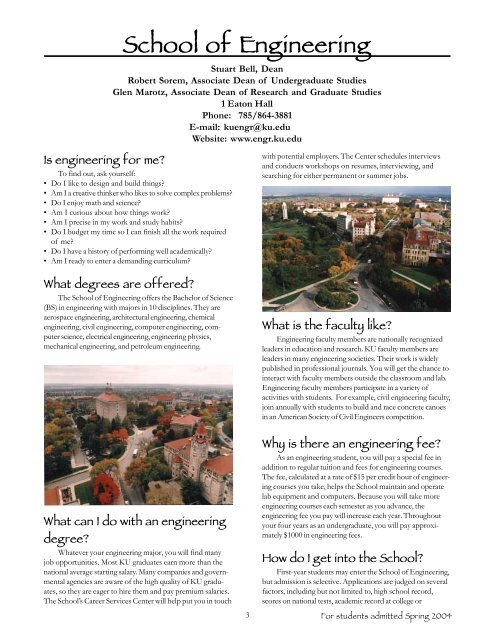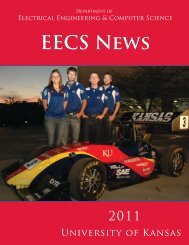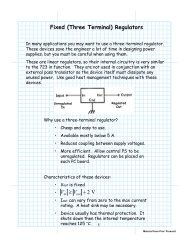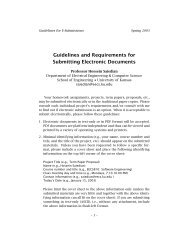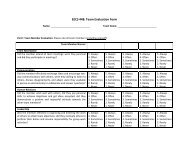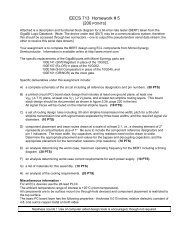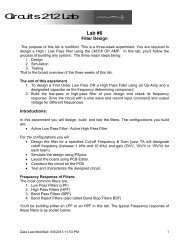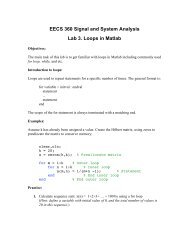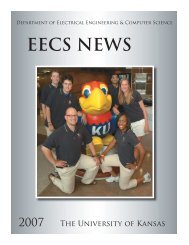Spring 2004 Handbook - Electrical Engineering and Computer ...
Spring 2004 Handbook - Electrical Engineering and Computer ...
Spring 2004 Handbook - Electrical Engineering and Computer ...
Create successful ePaper yourself
Turn your PDF publications into a flip-book with our unique Google optimized e-Paper software.
School of <strong>Engineering</strong>Stuart Bell, DeanRobert Sorem, Associate Dean of Undergraduate StudiesGlen Marotz, Associate Dean of Research <strong>and</strong> Graduate Studies1 Eaton HallPhone: 785/864-3881E-mail: kuengr@ku.eduWebsite: www.engr.ku.eduIs engineering for me?To find out, ask yourself:• Do I like to design <strong>and</strong> build things?• Am I a creative thinker who likes to solve complex problems?• Do I enjoy math <strong>and</strong> science?• Am I curious about how things work?• Am I precise in my work <strong>and</strong> study habits?• Do I budget my time so I can finish all the work requiredof me?• Do I have a history of performing well academically?• Am I ready to enter a dem<strong>and</strong>ing curriculum?What degrees are offered?The School of <strong>Engineering</strong> offers the Bachelor of Science(BS) in engineering with majors in 10 disciplines. They areaerospace engineering, architectural engineering, chemicalengineering, civil engineering, computer engineering, computerscience, electrical engineering, engineering physics,mechanical engineering, <strong>and</strong> petroleum engineering.with potential employers. The Center schedules interviews<strong>and</strong> conducts workshops on resumes, interviewing, <strong>and</strong>searching for either permanent or summer jobs.What is the faculty like?<strong>Engineering</strong> faculty members are nationally recognizedleaders in education <strong>and</strong> research. KU faculty members areleaders in many engineering societies. Their work is widelypublished in professional journals. You will get the chance tointeract with faculty members outside the classroom <strong>and</strong> lab.<strong>Engineering</strong> faculty members participate in a variety ofactivities with students. For example, civil engineering faculty,join annually with students to build <strong>and</strong> race concrete canoesin an American Society of Civil Engineers competition.What can I do with an engineeringdegree?Whatever your engineering major, you will find manyjob opportunities. Most KU graduates earn more than thenational average starting salary. Many companies <strong>and</strong> governmentalagencies are aware of the high quality of KU graduates,so they are eager to hire them <strong>and</strong> pay premium salaries.The School’s Career Services Center will help put you in touchWhy is there an engineering fee?As an engineering student, you will pay a special fee inaddition to regular tuition <strong>and</strong> fees for engineering courses.The fee, calculated at a rate of $15 per credit hour of engineeringcourses you take, helps the School maintain <strong>and</strong> operatelab equipment <strong>and</strong> computers. Because you will take moreengineering courses each semester as you advance, theengineering fee you pay will increase each year. Throughoutyour four years as an undergraduate, you will pay approximately$1000 in engineering fees.How do I get into the School?First-year students may enter the School of <strong>Engineering</strong>,but admission is selective. Applications are judged on severalfactors, including but not limited to, high school record,scores on national tests, academic record at college or3 For students admitted <strong>Spring</strong> <strong>2004</strong>


